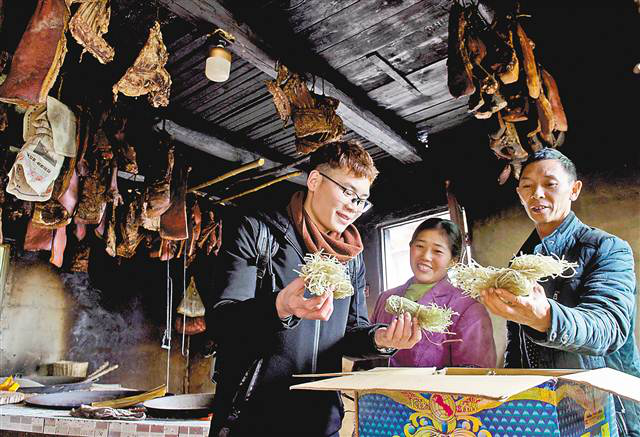E-commerce and delivery drive growth in remote Chongqing surrounds
p.china.org.cn by Jin Ling,March 09, 2018 Adjust font size:

Li Xiang, a 24-year-old resident in Daya County, Chongqing Municipality in southwestern China, buys sweet potato starch and smoked meat at a local’s home. [Photo by Cui Li]
Li Xiang, 24, was born in Daya County, Chongqing Municipality in southwestern China. Deemed one of the poorest counties in Chongqing, Daya government planned to lift villagers out of poverty by developing e-commerce. In September 2017, Li decided to go back home and open a service center to help villagers sell goods online.
Before then, Li was running a shop on Taobao, one of China's largest online marketplaces, in Guangzhou Province, some 1,000 kilometers away from Chongqing.
Many in Daya planted chilies as a food crop, but farmers only sold the few that are aesthetically pleasing. Some were made into chili paste, but most were left to rot in the fields.
Li suggested that villagers produce more chili paste for sale online, but was told that it’s too much trouble, and that he could have the raw product for free if he wanted.
To show that the product can be sold online, for a whole month, Li went door to door to educate villagers about e-commerce.
Li’s first online sale was two jars of chili paste. Dai Jun, a local, had sold a kilo of homemade paste to Li at 10 yuan (U.S. $1.6). Li then packed the product into glass jars and priced them online at 10 yuan each. Two days later, Li received an order.
“I never thought the paste could be sold online,” said Dai, when he was shown the sales records. He has since made more paste and brought Li more products, such as green beans, sweet potato starch and smoked meat.
Over time, more villagers gave e-commerce a shot. According to Li, one villager who lived in the mountains asked Li to help sell edible wild herbs he collected. The first batch was sold for around 100 yuan (U.S. $16).
Li says that the lack of timely delivery services was a barrier to developing e-commerce in Daya, as was the quality of certain products villagers tried to sell.
“The beans villagers brought were full of dust,” Li said. “I had to teach them how to dry and store the goods one by one.”
Daya is located in remote mountainous area and rarely traded with other regions. Until early this year, not a single private delivery company serviced the area. China Post, a state-owned enterprise, comes by only every few days. As a result, Li waited a whole week for his first two jars of chili paste to be sent out.
At the end of 2017, Pengshui Commercial Bureau, a local government body that oversees commerce, shifted policies to encourage delivery companies to set up shop in these remote regions. Today, Daya has its own delivery site.
Qin Shiqiang, a 26-year-old who also comes from the area, returned in 2016 and set up the “Pengshui Milin Wild Pig Raising Cooperative” with local farmers. In the second half of 2017, the first batch of pigs had grown enough to be sold. Upon hearing of Li’s e-commerce savvy, Qin asked him to help sell the pork online.
To show customers the pork’s quality, Li posted videos and photos of the pigs’ living environment in the mountains. Orders came in, some from outside the province.
According to Qin, pork from each pig could only generate about 1,000 yuan (U.S. $160) in profits via traditional channels, such as restaurants. Meanwhile, profits via e-commerce are around 1,500 yuan (U.S. $240) per pig. As online market grows, Qin plans to raise more pigs.
Currently, Li’s e-commerce shop generates a sales volume of about 7,000 yuan (U.S. $1,100) a month. As the amount of supply and demand grew, Li said there’s a need for more people to take part.
“So few people in Daya know how to run e-commerce,” said Li. “I hope more and more young people can join us.”